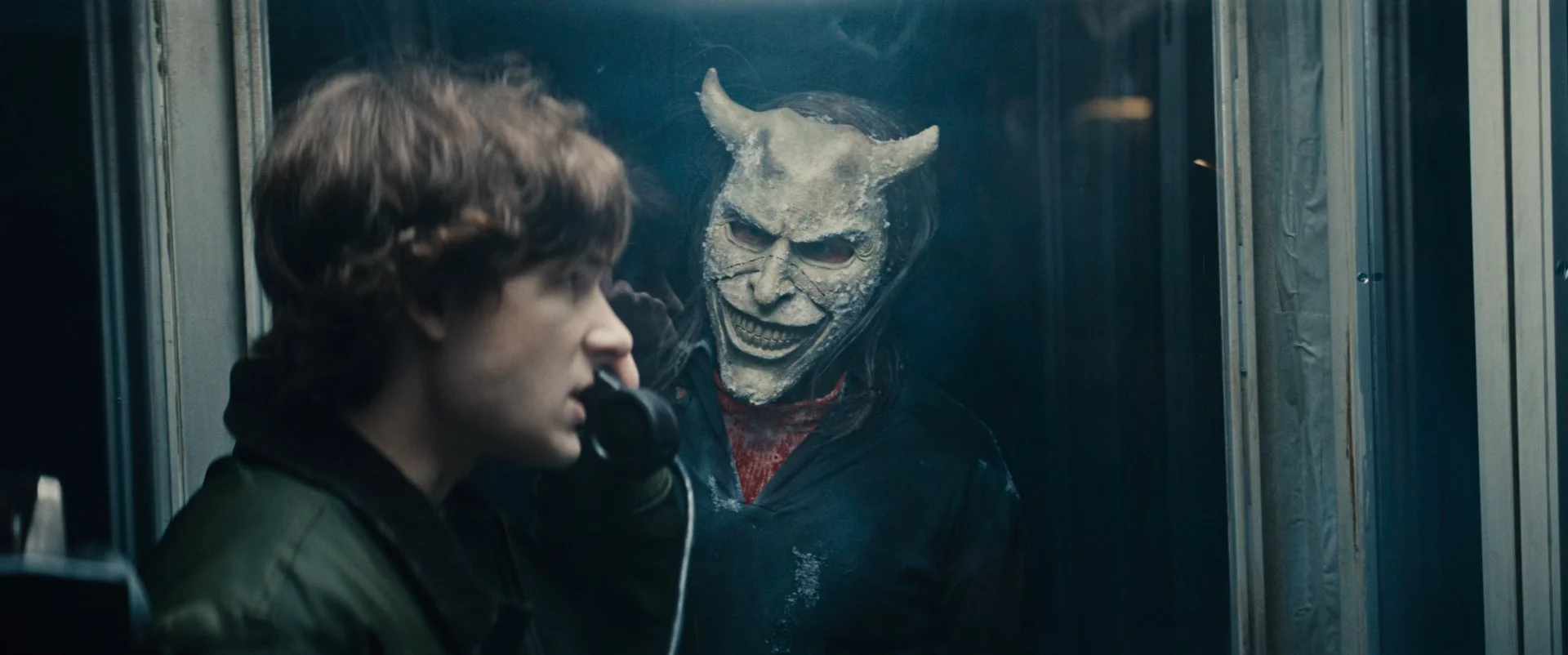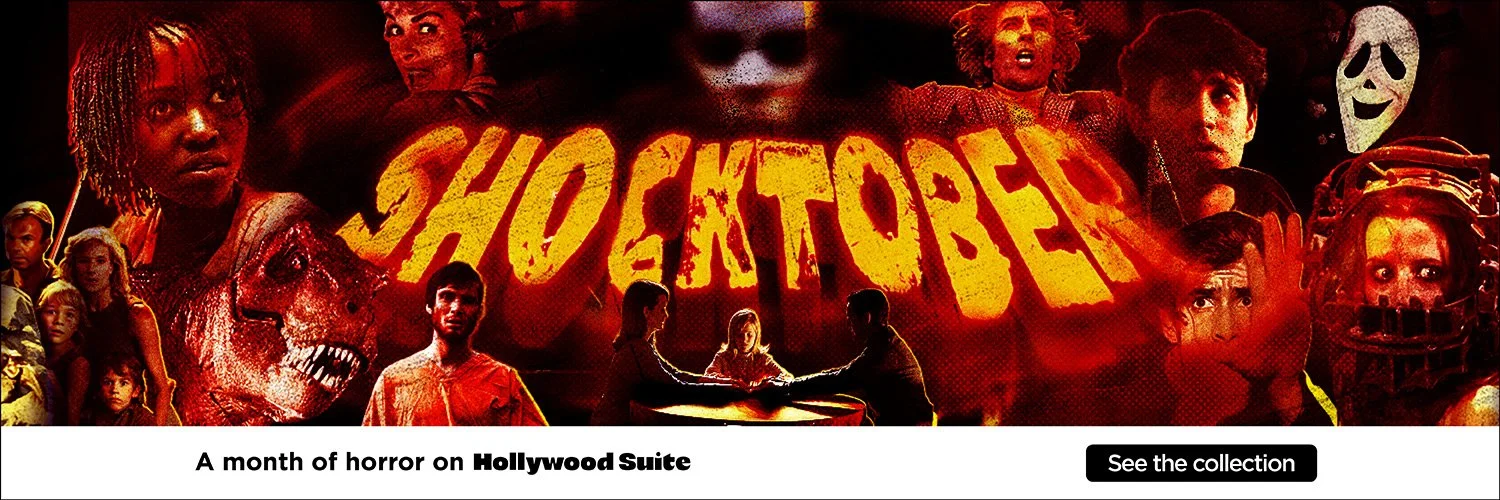Black Phone 2: Dialing the Supernatural, Hanging Up on the Human Touch
By Thom Ernst
B-
For Black Phone 2to work, there needs to have been a Black Phone 1—and thankfully, there was. Without it, this sequel would make little sense.
There are loose ends from the first film that the second dutifully ties up, but that’s where the continuity ends. The irony—or perhaps contradiction—is that the two films are different enough to stand alone. Where the original thrived on human terror, the sequel folds itself into supernatural cliché.
One is not necessarily better than the other…except that, in this case, one is.
Mason Thames and The Grabber (Ethan Hawke) in Black Phone 2
The first Black Phone—adapted from Joe Hill’s short story—was a grim and unsettling tale of child abduction. It carried the faint but unmistakable implication of sexual abuse, making it all the more horrifying because it felt possible, even familiar. Ethan Hawke’s “Grabber” (still one of cinema’s least inspired killer monikers) was not a ghost or a demon, but a human monster—a terrifyingly real one. His presence gave the story an earthbound gravity that balanced the supernatural thread of ghostly children whispering revenge through a disconnected phone.
It was suspenseful, harrowing, and—thanks to Mason Thames’ turn as Finney—emotionally satisfying. There was a pulse of humanity in the horror, something director Scott Derrickson channelled beautifully through Jeremy Davies’ portrayal of Finney’s broken, abusive father. It was ugly, painful, and unforgettable.
That ugliness is gone now, and a new ugliness takes over. Black Phone 2 is nastier, more violent and more graphic.
Black Phone 2 abandons the real-world dread of child abduction for a loud, effects-heavy ghost story. What was once a crime drama with supernatural undertones has become Stranger Things by way of Nightmare on Elm Street.
Finney returns, played again by Thames, but the boy who once fought for survival is now an angry loner haunted by nightmares of the Grabber. Gwen (Madeleine McGraw), his fierce and faith-driven sister who helped save him in the first film, is now the film’s prime subject, although her heroism from the first film seems forgotten.
And then there’s the Grabber. Still dead, still masked, but death, as one character reminds us, is “just a word.” Or maybe it was “fear is just a word.” Hard to tell, and that’s part of the problem—the dialogue flirts with profundity but rarely earns it. Either way, with the skeleton crew snowed in at a mountain resort as his captive audience, the ghost of The Grabber is out for revenge.
Gwen’s dreams now serve as the sequel’s anchor—a torrent of violent, religiously tinged nightmares where mutilated children frolic at a Christian youth camp before being slaughtered. Her nightmares spill into waking life; she wakes with bruises, cuts, and flung across the room as if the walls were made of rubber. These moments are effective, but they belong to another kind of movie—a slick supernatural horror, not the grounded human tragedy that made the first film sting.
The story opens in 1957 in an isolated mountain resort covered in snow. At first, it feels disconnected from everything that came before—new characters, new setting, new tone—but co-writers Joe Hill, Derrickson, and C. Robert Cargill eventually tie it all back, if loosely. Derrickson’s return to the director’s chair does yield striking images; the Colorado setting evokes a kind of frozen purgatory, at times recalling the haunted chill of The Shining.
But Black Phone 2 can’t decide what it wants to be. Its overt Christian moralizing—heaven, hell, good, evil—collides awkwardly with its appetite for blood and jump scares. For balance, we get two Christian caricatures, Barb (Maev Beaty) and Ken (Graham Abbey)—names with too much pop-culture significance to be accidental—whose sanctimony invites audience scorn. They exist to be mocked, punished, and, eventually, punished some more.
Jeremy Davies’ return as Terrence, the father, is perhaps the film’s most grounded touch. But the character has softened, even found redemption, and although that’s welcomed, it leaves a gaping hole for the kind of emotional rawness he carried in the first film—the belt, the fear, the unbearable realness—is nowhere to be found. That’s emblematic of the entire film: an echo of something once human, now buried under spectacle.
There’s still plenty to admire: Derrickson’s eye for atmosphere, the bleakly beautiful snowscapes, and a handful of effective scares. But where The Black Phone haunted you with what might happen, Black Phone 2 simply tells you what will.
If Ethan Hawke’s Grabber is destined to become his new horror franchise persona, so be it—but they’ll need to find him a better name. And perhaps a better reason to call back.
Black Phone 2 is directed by Scott Derrickson and stars Mason Thames, Madeleine McGraw, Ethan Hawke, Jeremy Davies, Maev Beaty, and Graham Abbey. Black Phone 2 is currently playing in select theatres.


